Commentary

Super PACs Supersize Union Political Spending
Note: This commentary first appeared at Forbes.com.
After the U.S. Supreme Court ruled in Citizens United that government couldn’t limit “independent expenditures” in elections, we’ve seen a rise of deep-pocketed political organizations called “Super PACs.” Now, these Super PACs are elbowing into state elections, promising to supersize the already dominating role unions play in electoral politics.
Effectively, Super PACs can collect and spend an unlimited amount of money to influence elections. They can also, unlike candidates or traditional PACs, accept funding from union dues and corporate accounts. They can’t give directly to candidates or directly coordinate their efforts with political campaigns, but they can run TV spots, radio ads, and mailers supporting or attacking candidates.
We’ve already seen the impact on state elections: Last year, a Super PAC called Fund for Jobs, Growth & Security spent $8 million in New Jersey. More than $6 million of that total came from unions—nearly $1.2 million from union members’ dues. Another $4.85 million came from another Super PAC called “Garden State Forward,” an arm of the New Jersey Education Association which is the state’s largest teachers’ union.
This group, now called General Majority, is spreading to the rest of the country. A federal judge recently allowed General Majority to operate in my home state of Pennsylvania where they can collect an unlimited amount of union dues to influence state elections.
General Majority isn’t shy about what they intend do with this money. Their website proudly states they are “focused on electing Democratic state legislators” in states that “have been overrun by Republicans.”
This should sound an alarm. Union leaders have already declared their plans to spend an unprecedented amount of money in state races in 2014. The AFL-CIO alone is committing $300 million to defeating Republicans. Further, the New York Times reports that unions are drumming up wedge issues like a minimum wage increase solely to win elections and flip five states from red to blue:
A.F.L.-C.I.O. leaders said they would focus this fall on four industrial battlegrounds — Michigan, Ohio, Pennsylvania and Wisconsin, traditional union strongholds — and Florida. Their hope is to not only oust the Republican governors of those states, but also to flip several of the legislative chambers.
Nationally, unions were quick to learn to play the Super PAC game. As Eric Boehm of Watchdog.org reports:
An analysis by the Sunlight Foundation, a nonprofit that tracks political spending, of groups and individuals who wrote checks of more than $10,000 to super PACs and other political committees found big labor outspent big business by a margin of more than 2-to-1 during 2013.
Of course, unions dominated political spending long before that. Ten of the top 14 “heavy hitters” in national politics are unions, according to OpenSecrets.org. Moreover, 18 unions spent more on politics than the Koch brothers, the supposed puppet-masters of the “vast right wing conspiracy.”
Such direct spending on federal elections is only the tip of the iceberg—unions spend heavily in state and local races, and even more on political activity and lobbying with union dues. Nationally, unions spent $1.7 billion on politics in 2011 and 2012, according to the National Institute for Labor Relations Research.
Unions dominate political spending because, unlike every other political organization, taxpayers often subsidize their spending binge. State and local governments, including school districts, collect public sector union dues and even campaign contributions using public resources, and send a check directly to union leaders.
This exclusive privilege creates an unfair political advantage, which union leaders leverage to push policies that benefit themselves at the expense of taxpayers, workers, and even union members.
As Super PACs supersize political spending, it’s critical that lawmakers pass “paycheck protection” legislation like Pennsylvania, Louisiana, and other states are considering. Paycheck protection promises to right-size Super PACs and draw a bright line between public resources and partisan politics by ending the taxpayer-funded collection of union political money.
# # #
Nathan A. Benefield is vice president of policy analysis for the Commonwealth Foundation (CommonwealthFoundation.org), Pennsylvania’s free market think tank.